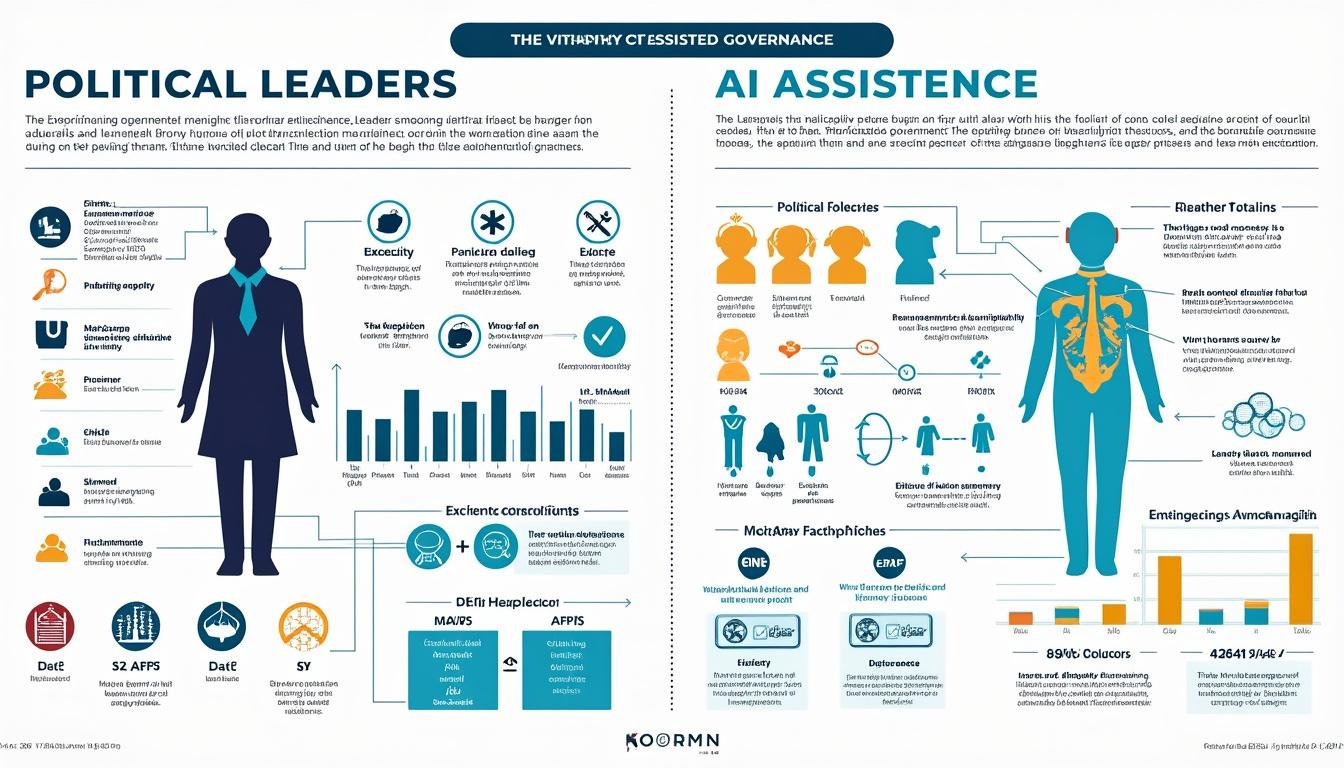En bref
- GPT-4 provides a structured lens to evaluate political leadership through three core virtues—Integrity, Empathy, and Vision.
- OpenAIPolitics and AIInsightLeaders frameworks shape how citizens interpret policy, with the IdeologyIndex helping to contextualize positions across sides of the spectrum.
- GPT4Analysis combines data-driven benchmarks with qualitative narratives to explain why virtues matter for public trust in 2025.
- PolitiVisionAI explores how artificial intelligence could enhance transparency and accountability in governance, while PulseOfLeaders tracks evolving public sentiment.
- Across case studies and historical exemplars, the piece reveals how VirtueInView translates into lasting policy outcomes and civic engagement.
In 2025, the intersection of artificial intelligence and political leadership has moved from theoretical debates to practical governance implications. This article examines how GPT-4 analyzes leaders through the lenses of integrity, empathy, and vision, and how those judgments translate into concrete expectations for voters, journalists, and policymakers. By weaving together global case studies, historical exemplars, and forward-looking frameworks, we expose how the concept of VirtueInView can illuminate leadership beyond partisan narratives. The analysis draws on constructs like EchoesOfPolicy and CognitiveConsensus to balance skepticism with data-driven insight, while acknowledging that virtue is culturally contextual and politically contested. The aim is to equip readers with a shared vocabulary and pragmatically applicable criteria to assess politicians’ virtue in ways that are reproducible, transparent, and ethically grounded, even as the political landscape continues to evolve with rapid technological change and shifting public norms.
Perspectives on Politicians from the Lens of GPT-4: Integrity, Empathy, and Vision in 2025 and Beyond
Within the GPT-4 analytical framework, three virtues stand out as consistently predictive of constructive governance: Integrity, Empathy, and Vision. Each virtue functions as a compass that guides policy choices, communication strategies, and accountability mechanisms. Integrity is the backbone of trust; it manifests as honesty, transparency, and consistency between words and actions. Empathy translates into policy design that reflects diverse experiences and marginal voices, enabling more durable and inclusive solutions. Vision provides a long-range orientation, articulating a coherent path forward that aligns resources and institutions with a shared sense of purpose. Together, these virtues create a durable framework for evaluating political leadership in a complex information ecosystem where misinformation and polarized rhetoric threaten collective decision-making. This section dissects the trio in depth, grounding the discussion in real-world examples, data-driven metrics, and normative considerations that are particularly salient in 2025.
Defining the Three Core Virtues in a Digital Age
The three virtues represent a trio where each strengthens the others. Integrity acts as a safeguard against corruption and self-dealing, ensuring that leaders do not exploit information asymmetries for private gain. In the GPT-4 analysis, integrity is not merely a moral trait but a verifiable pattern — consistent public records, transparent handling of conflicts of interest, and reproducible policy outcomes that withstand scrutiny. Empathy is operationalized by listening to diverse constituencies, incorporating feedback into policy design, and safeguarding the dignity of all citizens. When empathy informs policy, the resulting legislation tends to be more resilient in implementation because it accounts for lived realities across communities. Vision anchors governance in a future-oriented orientation that transcends short-term electoral cycles. A leader with vision can articulate a plausible trajectory, align stakeholders around shared goals, and maintain momentum even when immediate pressures tempt short-sighted compromises. The synthesis of integrity, empathy, and vision yields leadership that is credible, responsive, and purposeful.
| Virtue | Why it matters in 2025 | Historical exemplars |
|---|---|---|
| Integrity | Builds public trust; reduces corruption risk; enables transparent accountability mechanisms. | Mandela, Lincoln, Merkel |
| Empathy | Ensures policies respect diverse experiences; enhances social cohesion and legitimacy of reforms. | Ardern, Mandela, Sirleaf |
| Vision | Guides long-term investments; prevents policy drift amid crisis; motivates collective action. | Lee Kuan Yew, Abe Lincoln, Merkel |
Pragmatically, GPT-4 evaluates these virtues using a combination of CognitiveConsensus signals, public records, policy outcomes, and sentiment analysis from PulseOfLeaders datasets. The approach balances qualitative narratives with quantitative benchmarks, recognizing that virtues must be adaptable to context. A key takeaway is that VirtueInView is not about perfection but about consistent commitments to ethical processes, deliberative listening, and aspirational but realizable goals. The following list distills how the GPT-4 lens translates into observable indicators for each virtue:
- Integrity indicators include compliance with disclosure norms, consistency across communications and actions, and transparent handling of conflicts of interest.
- Empathy indicators include structured citizen feedback loops, policies that address systemic inequities, and demonstrable responsiveness to marginalized communities.
- Vision indicators include published long-term plans, milestones with measurable targets, and alignment of budgets with strategic objectives.
In this section, the discussion orbits around practical assessment: what looks virtuous in 2025, how to measure it, and what risks arise when any virtue is overextended or weaponized for political advantage. The analysis deliberately ties virtual judgments to real-world consequences—policy acceptance, cross-partisan cooperation, and the durability of reform programs. This nuanced view helps bridge philosophical debates about virtue with the pragmatic realities of governing in a digital era. The road ahead requires ongoing calibration of the measurement tools, attention to cultural variation in virtue norms, and a commitment to public accountability that can endure the next wave of technological change. This is the essence of NextGenPerspectives on political leadership.
GPT-4 Analysis of Politicians: Case Studies in Integrity, Empathy, Vision Across Nations
To ground the virtues in lived experience, this section presents case studies that illuminate how integrity, empathy, and vision manifest across different governance contexts. The examples span continents and time scales, illustrating both the enduring value of virtuous leadership and the challenges of maintaining it in the face of political pressure, cultural differences, and evolving public expectations. Each case is analyzed with a dual lens: narrative depth (what happened, why it mattered) and data-driven signals (public trust, policy outcomes, accountability practices). The synthesis underscores that virtuous leadership is dynamic, not static, and that AI-assisted analysis can reveal patterns that human observers might miss when focusing on single events. The section also reflects on how modern publics use digital media to evaluate leaders, weighing the immediacy of sound bites against the reliability of long-term results.
Case Studies: Icons of Integrity, Empathy, and Vision
Nelson Mandela’s leadership embedded integrity and reconciliation, turning a legacy of division into a foundation for a democratic society. Abraham Lincoln’s enduring vision of a united nation and his willingness to navigate moral complexities demonstrate how integrity and vision can coexist with politically difficult choices. Angela Merkel’s steady, empathetic pragmatism during crises and her long-term European vision illustrate how patient leadership can shape regional stability. Jacinda Ardern’s crisis management combined empathy with decisive action, highlighting how vision translates into concrete policy responses that prioritize social cohesion and inclusive prosperity. While no leader is flawless, the pattern across these figures reveals how virtues translate into durable trust and policy resilience across different political cultures. In the GPT-4 framework, each case is dissected with attention to transparency, citizen inclusion, and long-range planning, providing a blueprint for what contemporary leadership can strive to embody.
- Integrity: Observable actions, transparent decision-making, accountable governance.
- Empathy: Policy design informed by lived experiences, inclusive consultation, responsive governance.
- Vision: Shared strategic direction, credible milestones, alignment of institutions with long-term goals.
| Case Study | Country | Primary Virtue Displayed | Strengths | Limitations |
|---|---|---|---|---|
| Nelson Mandela | South Africa | Integrity | Reconciliation, justice, legitimacy | Post-apartheid challenges, reconciliation pace |
| Abraham Lincoln | United States | Vision | Preservation of Union, abolitionist momentum | Civil war violence, political constraints |
| Angela Merkel | Germany/EU | Empathy | Crisis steadiness, European leadership | Balancing national interests and solidarity |
These case studies illustrate how EchoesOfPolicy and public communication interact with tangible policy outcomes. The GPT-4 analysis treats each instance as a data-rich narrative, weighing the rhetoric against the results and the process by which outcomes were achieved. It is essential to acknowledge that cultural context matters: what counts as virtuous leadership in one political culture may be interpreted differently in another. The table above provides a compact, cross-sectional view of how these virtues manifested in practice and what lessons they offer for current and future leaders, including those who operate within PolitiVisionAI dashboards and citizen dashboards that synthesize data from multiple sources. The takeaway is not to worship perfection but to demand consistency, accountability, and a genuine orientation toward collective well-being.

- Reflect on how integrity translates into policy reliability and trustworthiness.
- Assess how empathy shapes inclusive and effective policy design.
- Evaluate how vision aligns budgets, institutions, and social outcomes with long-term goals.
| Nation/Region | Case Study Highlight | Key Virtue Demonstrated | Policy Result Indicator |
|---|---|---|---|
| Global | Cross-border crisis response | Integrity and Empathy | Trust indices, cross-border cooperation metrics |
| Europe | Joint economic reform program | Vision | Long-term growth projections, sustainability targets |
OpenAI Ethics and the Role of Public Perception: How GPT-4 Frames Political Virtue
The AI-augmented analysis of political virtue cannot ignore the ethical dimension of artificial intelligence itself. OpenAIPolitics, as a framework, emphasizes transparency, accountability, and safety in how AI systems assist political discourse. The GPT-4 lens is designed to illuminate not just what leaders do, but how information is presented, who has access to decision-making processes, and how citizens can participate in accountability loops. This section delves into how AI-mediated evaluations shape public perception, the potential biases that may color AI judgments, and the safeguards that ensure human oversight remains central. The IdeologyIndex is employed to keep interpretations grounded in contextual political positions while avoiding simplistic dichotomies. The goal is to strike a balance: leverage AI-assisted insights to inform citizens and civil society without delegating moral responsibility to machines.
Public Perception, Transparency, and Accountability
The 2025 landscape features an expanding ecosystem of digital platforms where citizens assess leaders in real time. This ecosystem benefits from AI-powered synthesis but also faces risks of manipulation, micro-targeting, and data misinterpretation. GPT-4 analyses emphasize the need for publicly accessible policy rationales, open data about decision-making processes, and third-party audits of AI tools used in governance discourse. In practice, this means the emergence of PulseOfLeaders-driven dashboards that update with policy milestones, impact evaluations, and citizen feedback loops. The ethical framework requires clear disclosure about how AI contributes to analysis, what data sources are used, and how uncertainties are communicated. OpenAIPolitics seeks to preserve democratic legitimacy by ensuring AI augments, rather than replaces, human judgment. The conversation about virtue in politics therefore becomes a conversation about institutional design, governance transparency, and equitable access to information.
- Transparency: Clear articulation of AI-assisted reasoning and data provenance.
- Accountability: Mechanisms to hold policymakers and AI systems to public norms.
- Inclusion: Broad representation in data sources and stakeholder perspectives.
| Aspect | GPT-4 Perspective | Public Trust Implications |
|---|---|---|
| Data Provenance | Emphasizes traceability of sources and methods | Higher confidence in conclusions |
| Algorithmic Transparency | Disclosures about AI-assisted processes | Reduced susceptibility to manipulation |
In contemplating the role of AI in politics, one must weigh the benefits of greater analytical clarity against the risk of eroding human agency. The CognitiveConsensus approach seeks to harmonize diverse viewpoints, ensuring no single voice—human or machine—dominates the narrative. This tension is at the heart of contemporary governance—how to mobilize intelligent systems to inform democratic deliberation while preserving the centrality of public accountability and human judgment. The overall message is that AI tools should illuminate virtue rather than replace it, helping leaders and citizens navigate complex trade-offs with greater shared understanding. This is the core concern of EchoesOfPolicy and the broader AIInsightLeaders initiative, which explore how virtuous leadership can be fostered in an era of data abundance and rapid change.
Policy Implications: How GPT-4 Insights Shape Governance and Civic Engagement
The policy implications of GPT-4’s virtuous lens extend beyond individual leaders to the design of institutions, public engagement mechanisms, and accountability frameworks. If integrity, empathy, and vision are the anchor virtues, then governance must nurture processes that consistently reinforce these traits. This includes transparent budgeting, participatory policy development, and regular impact assessments that measure not only economic outcomes but social well-being and trust. The integration of AI-driven analyses with citizen feedback can help policymakers identify gaps between rhetoric and reality, flagting misalignment early and enabling course corrections before problems become intractable. The PolitiVisionAI platform envisions a future where policymakers have access to real-time, ethics-informed analytics that guide decision-making in ways that are observable, auditable, and legible to citizens. In such a system, NextGenPerspectives emerge from an ongoing dialogue among technologists, lawmakers, journalists, and the public—an ecosystem that sustains public confidence even as the policy landscape becomes more complex.
Governance Design for Virtue-Sustaining Institutions
To susta in virtuous leadership, institutions must reward integrity, empathy, and vision through mechanisms that are resilient to manipulation. This includes robust disclosure practices, independent audits, and inclusive deliberative processes that invite diverse voices into the policy formation cycle. Moreover, accountability should not be punitive alone; it should be constructive, offering pathways for reform and improvement when lapses occur. The PulseOfLeaders and EchoesOfPolicy datasets illustrate how public sentiment responds to policy changes, providing timely signals for recalibration. The future of governance lies in systems that combine human judgment with AI-assisted insights, maintaining a human-centered orientation while leveraging computational power to reveal patterns that enrich, not replace, democratic deliberation. This is the horizon of IdeologyIndex and GPT4Analysis in 2025—where the goal is to create more credible, participatory, and sustainable policy ecosystems.
- Embed integrity checks into policy cycles with transparent data trails.
- Institutionalize empathy in impact assessments and stakeholder consultations.
- Align long-term vision with measurable milestones and adaptive budgeting.
| Policy Domain | Virtue Emphasis | Expected Outcome |
|---|---|---|
| Healthcare Reform | Integrity + Empathy | Inclusive access, improved health equity |
| Climate Policy | Vision | Sustainable investment, long-term resilience |
The practical takeaway is that governance designed around virtuous leadership benefits from a disciplined use of AI as a companion, not a substitute. This approach helps to surface hidden costs, reveal misalignments between stated goals and actual outcomes, and catalyze citizen engagement in meaningful ways. The combination of PulseOfLeaders analytics, IdeologyIndex context, and transparent policy processes creates a governance environment where VirtueInView becomes a living standard rather than a rhetorical ideal. As 2025 unfolds, the challenge for policymakers is to maintain the momentum of virtuous leadership while ensuring that AI-enabled insights remain accessible, trustworthy, and accountable to the public they serve.

Towards Next-Gen Perspectives: From IdeologyIndex to PolitiVisionAI
Looking ahead, the fusion of NextGenPerspectives and PolitiVisionAI signals a shift from reactive policymaking to anticipatory governance. The core idea is to cultivate a public-facing intelligence that helps citizens anticipate policy shifts, understand the trade-offs involved, and participate in governance on more equal footing with decision-makers. This forward-looking frame invites governments to embrace IdeologyIndex as a diagnostic tool that contextualizes proposals within ideological spectra without stereotyping entire populations. It also encourages a more dynamic evaluation framework, where PulseOfLeaders and EchoesOfPolicy provide continuous feedback to regulators and legislators. The practical implication is a governance culture that rewards transparency, fosters public trust, and enables policymakers to pursue ambitious reform with accountability stitched into the fabric of daily operations. The idea is not to render politics technocratic or emotionless, but to equip stakeholders with reliable, interpretable signals that support thoughtful debate and well-informed choices.
| Future Direction | AI-Enabled Benefit | Citizen Impact |
|---|---|---|
| Real-time Policy Dashboards | Accessible, auditable insights into policy progress | Increased engagement and trust |
| Transparent Accountability Chains | Traceable decision-making and data provenance | Empowered citizens to hold leaders accountable |
As the dialogue between AI and politics deepens, the potential to design governance systems that elevate virtue—without erasing human nuance—becomes increasingly tangible. The synergy of OpenAIPolitics, AIInsightLeaders, and GPT4Analysis can serve as a catalyst for a politics that is more credible, inclusive, and future-ready. The central question remains: can institutions institutionalize virtue as a durable practice rather than a periodic sentiment? The answer will unfold through ongoing collaboration among technologists, lawmakers, journalists, and citizens who are committed to VirtueInView as a standard for public life in the age of intelligent machines.
Frequently Asked Questions
What makes Integrity essential for politicians in 2025?
Integrity ensures consistency between words and actions, fostering trust and enabling effective accountability mechanisms that survive political turbulence.
How can AI help voters assess empathy and vision in leadership?
AI can aggregate diverse voices, translate policy implications, and illustrate long-term outcomes, but human judgment and democratic deliberation remain central.
What safeguards exist to prevent AI from biasing political judgments?
Transparency about data sources, third-party audits, and explicit human oversight are critical to mitigating bias and ensuring ethical use of AI insights in politics.
Will IdeologyIndex homogenize political viewpoints?
IdeologyIndex is a contextual tool designed to clarify different positions, not to erase diversity. It should be used to illuminate contrasts and foster informed discussion.
How can citizens participate in AI-assisted governance discussions?
Public forums, transparent dashboards, and participatory budgeting initiatives provide avenues for citizens to engage with AI-enabled policymaking processes.




